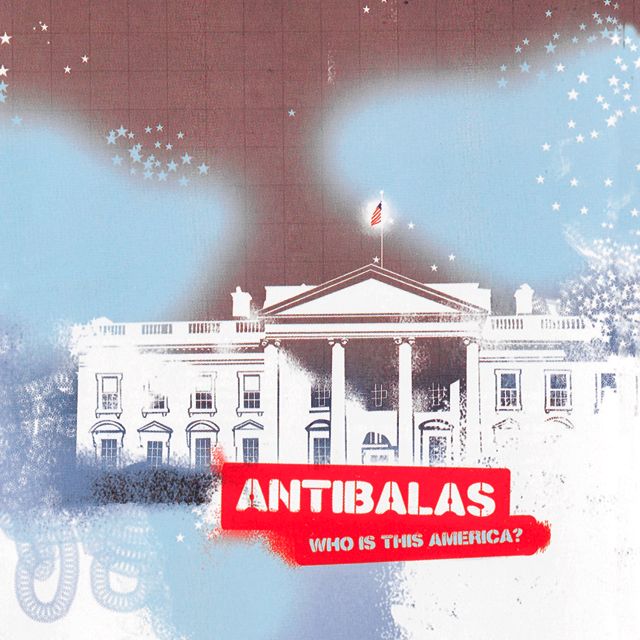Home » Jazz Articles » Afrobeat Diaries » Part 15 - Femi Kuti: Africa For Africa / Antibalas: Who ...
Part 15 - Femi Kuti: Africa For Africa / Antibalas: Who Is This America?
 Femi Kuti
Femi KutiAfrica For Africa
Wrasse Records
2010
Two decades and more down the line with his band, Positive Force, singer and multi-instrumentalist Femi Kuti gets better and better. His take on rhythm may not be the same as that of his father—and why should it be?—but in other respects Femi is keeping Fela's musical flame alive. Positive Force is a horns heavy, ass kicking little big band; Femi's use of call and response vocals is at least as sophisticated as his father's; and, perhaps most important of all, Femi is an uplifting lyricist not afraid to take on the same issues, and confront the same venal class of politicians, military and bureaucrats, as Fela.
Most of the tracks on Africa For Africa last between three and five minutes—short by the measure set down by Fela and not permitting the extended instrumental sections which were a feature of Afrika 70 and Egypt 80 albums. But every one of the 14 pieces, even the shortest, which runs to just a couple of verses, contains some of the same vivid lyric writing which distinguished Fela's songs.
Outstanding among them are "Nobody Beg You," "Make We Remember" and "Obasanjo Don Play You Wayo." On the first and third of these, Femi uses the vocal chorus not only to repeat and drive home his own lines but also, as Fela did on some of his greatest songs (unforgettably on "Zombie"), to itself move the plot on by delivering the punch line which the lead singer has set up. So, on "Obasanjo Don Play You Wayo," after Femi has castigated the Nigerian judicial system for its shameful, 40-year (and counting) failure to root out and punish political corruption, it is the chorus who lock the lyric down with the chant: "(you cannot jail) friend to the, brother to the, sister to the, father to the, mother to the, daughter to the, wife of the senator." And on "Nobody Beg You," after Femi has sung "nobody beg you to be public servant," it is the chorus who deliver: "na dem dey beg us to be public servant." The sense of togetherness and shared values which Fela fostered at Kalakuta Republic and the original Shrine club is in Femi's music, as it was in Fela's, reflected in microcosm in this symbiotic relationship between lead singer and chorus.
Femi is a catchy songwriter too, and strong melodic motifs populate his hooklines and arrangements; most of the tempos and atmospheres on Africa For Africa are fierce and assertive, but they are tempered by tunefulness. The horn arrangements are more global in outlook than those typically used by Fela, with more Caribbean and Latin traces; but like Fela's, they're rich, turbulent and propulsive, and nearly as important to each song as the vocal topline. Femi's rhythms too are more eclectic than his father's, including West African, Latin, funk and Caribbean patterns.
Ears so far attuned only to Fela's original Afrobeat may need minor recalibration for Femi's spin to take hold. Give it a chance, it's well worth it.
 Antibalas
AntibalasWho Is This America?
Ropeadope
2010 (2004)
Brooklyn's superb Antibalas has been together for about a decade and long ago developed into an authentic Afrobeat outfit. Much of the success of the Broadway musical Fela! derives from Antibalas' performance and the in-the-tradition arrangements of its trombonist Aaron Johnson and trumpeter Jordan McLean, now released as Fela! Original Broadway Cast Recording.
Reissued (with a bonus track) to ride the Fela! wave, Who Is This America? was originally released in 2004, and six years later still sounds every bit as compelling. Antibalas doesn't just have the Afrobeat basics down—the exclamatory, jousting horns, the signature beats, the call and response vocals, the lyric trajectory—it also isn't afraid to take empathetic liberties with the style's codification. The result preserves Afrobeat's past glories while moving them forward.
It's a seamless affair, by no means episodic, but the album breaks down into three types of track. Extended lyrics are features of "Who Is This America Dem Speak Of Today?," "Big Man" and "Sister" (the shortest of these tracks lasts 07:55 minutes, the longest 19:14); horns and keyboards are the focus of "Pay Back Africa," "Indictment" and "Money Talks" (the bonus track), which between them include outstanding solos from Johnson, McLean, tenor saxophonist Stuart Bogie and baritone saxophonist Martin Perna; and on "Obanla'e" and "Elephant," percussionist Ernesto Abreu takes over lead vocals, weaving traditional Yoruba chants into Antibalas' 21st century mix.
In Lagos, Seun and Femi Kuti are moving things forward; in Brooklyn, Antibalas and Akoya Afrobeat are doing the same; Chicago, with Chicago Afrobeat Project, and London, with Soothsayers, when it's not in roots reggae mode, are not far behind; many other cities worldwide have emergent Afrobeat scenes. Fela! is being staged on Broadway and at London's Royal National Theatre. Things are looking good.
Tracks and Personnel
Africa For Africa
Tracks: Dem Bobo; Nobody Beg; Politics In Africa; Bad Government; Can't Buy Me; Africa For Africa; Make We Remember; Obasanjo Don Play You Wayo; Boys Dey Hungry For Town; Now You Go See; No Blame Them; Yeparip; E No Good; It Don't Mean.
Personnel: Femi Anikulapo Kuti: vocals, saxophones, organ, trumpet; Opeyemi Awomolo: lead guitar, bandleader; Tiwalade Ogunlowo: trombone; Olusolo Alobalorun: trumpet; Seye Adewunmi: trumpet; Dotun Bankole: tenor saxophone; Daniel Bankole: baritone saxophone; Adebowale Oloko-Obi: drums; Onome Kate-Udi: backing vocals; Bose Ajila: backing vocals; Anthonia Bernards: backing vocals; Oluwaseun Ajayi: keyboards; Akin Akinboro; percussion, clef; Adekunle Osunniran: percussion, shekere.
Who Is This America?
Tracks: Who Is This America Dem Speak Of Today?; Pay Back Africa; Indictment; Big Man; Obanla'e; Elephant; Sister; Money Talks.
Personnel: Amayo: lead vocals, percussion; Ernesto Abreu: congas, lead vocals (5, 6); Victor Axelrod: electric piano, organ, clavinet; Philip Ballman: drums; Stuart Bogie: tenor saxophone; Dylan Fusillo: percussion; Aaron Johnson: trombone; Jordan McLean: trumpet; Nick Movshon: bass; Luke O'Malley: guitar; Martin Perna: baritone saxophone; Gabriel Roth: guitar; Del Stribling: bass; Fernando Velez: congas. Guests: Geoff Mann: shekere (1); Tom Brenneck: guitar (3); Alex Kadvan: cello (3); Entcho Todorov: violin (3); Mayra Vega: backing vocals (5); Ogugua Iwelu: backing vocals (7); U Poppa Dobi: backing vocals (3); Olia Toporovsky: backing vocals (3); Veronica Cuevas: backing vocals (3); Babatunde Adebimpe: backing vocals (4).
Tags
PREVIOUS / NEXT
Support All About Jazz
 All About Jazz has been a pillar of jazz since 1995, championing it as an art form and, more importantly, supporting the musicians who make it. Our enduring commitment has made "AAJ" one of the most culturally important websites of its kind, read by hundreds of thousands of fans, musicians and industry figures every month.
All About Jazz has been a pillar of jazz since 1995, championing it as an art form and, more importantly, supporting the musicians who make it. Our enduring commitment has made "AAJ" one of the most culturally important websites of its kind, read by hundreds of thousands of fans, musicians and industry figures every month.




















